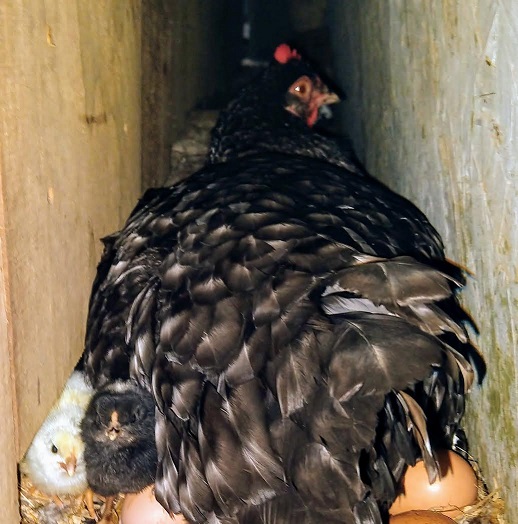Currently, Doris and Ginger have been sitting on eggs for about 20 days (that I’m aware of). Today, when peeking around the piece of plywood leaning against the wall where Doris has been brooding, there were two extra little fuzzy faces that looked back at me. The first two I saw were one of each black and yellow. Later in the day while I was arranging the camera, food, water, and a better shelter for them, a total of 7 (five black and two yellow) came out to see the world, likely for the first time ever. Judging by their level of activity and fluff, they were likely born yesterday afternoon or evening. They were peeping, and still too young to know anything about danger or realize that a hand is connected to a much larger, more powerful being, so paid no mind when I put my hand near a couple of them to investigate. In a few days when they realize that their days mostly consist of me not being around, they’ll probably grow a little more wary. It will be interesting to see how these babies develop; it’s very likely that some of the eggs she was sitting on aren’t hers, although her understanding of genetics isn’t very good, so it won’t matter to her if a couple of chicks weren’t from eggs laid by her.

A repurposed dog kennel was set up with the hopes that Doris and her babies will move out of the crevice she’s been in, and be a bit more protected. For now the kennel was prepared and put nearby, but once it looks like she’s finished hatching all the eggs she’s going to hatch and the little ones get more adventurous, the food and water will be moved temporarily into the kennel to familiarize them with it, and the kennel will be moved into the barn to offer more protection from the elements and other outside dangers.
It’s great that Doris found a comfortable spot and decided to hatch some youngins. Seven seems like a lot, and there may be more, but Chickens and other birds lay so many eggs and often hatch such large clutches of eggs because often times in the unforgivable wild the survival rate is often not very high due to the harshness of nature as the fragility of the baby chicks for the first many weeks of their lives. A baby chick is prey for nearly every carnivore out there, and many smaller carnivores that woudn’t typically try to attack a chicken. Often times it’s even not uncommon to even hear of rats attacking baby chicks left unprotected. Luckily, we’ve got an asute rooster that ususally sticks close by and watches for predators, and a very protective mother hen ready to give the signal to all hide under neath her.
At this point it’s unknown how many total eggs Doris will hatch, but Ginger has 11 under her, which should be hatching any day now as well.
We’re going to need a bigger coop!